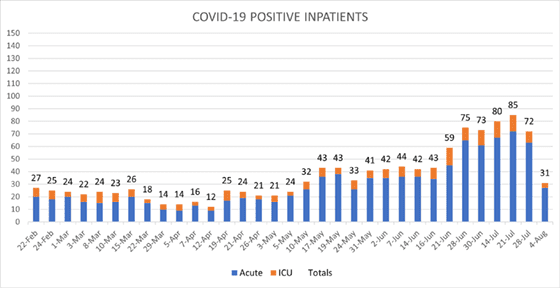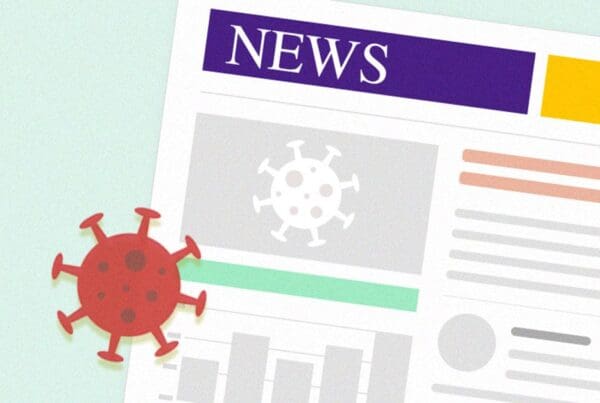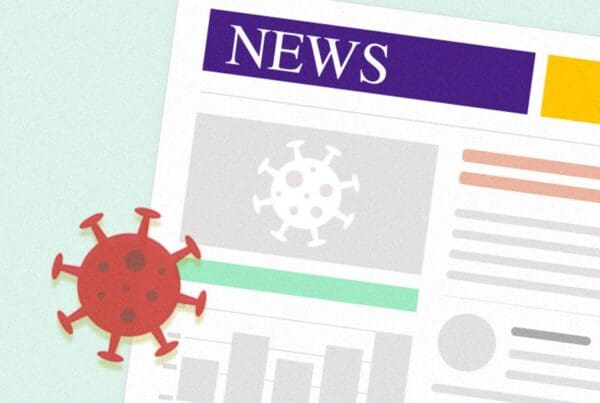QUICK READ:
- Earlier today, the monkeypox pandemic was declared a public health emergency in the United States.
- UW Medicine has activated the Emergency Operations Center to coordinate our system response.
- Monkeypox vaccine is in limited supply nationwide and is being prioritized for high-risk populations.
- Employees who have had unprotected exposures to monkeypox at work should contact Employee Health for guidance.
- Good news: COVID-19 cases, hospitalizations and deaths are declining in King County.
While the latest reports on COVID-19 show promising downward trends, another infectious disease has emerged as a growing threat locally and around the world. Monkeypox, a disease rarely seen previously in the U.S., was declared today a public health emergency by the federal government. It has been reported in nearly every state, including Washington, with more than 140 cases in King County.
But here’s the good news: we’ve learned a lot in the past two and a half years about how to respond to epidemics. Now nearing the end of our third summer of the COVID-19 pandemic, cases, hospitalizations and deaths in King County are all trending down. The numbers of patients and healthcare workers currently infected with COVID-19 across UW Medicine are at their lowest levels in weeks. And nearly 82 percent of county residents have completed their primary vaccine series. While we must remain vigilant in our preventive measures, these are reasons to be optimistic.
We should also be grateful that much of what we learned in our fight against COVID-19 can be used to more effectively combat monkeypox. This week, we reactivated our system Emergency Operations Center (EOC), which has played a crucial role in coordinating our response to COVID-19. The Infectious Disease teams at Harborview have done a phenomenal job leading this effort for UW Medicine to this point, and we are now expanding our response.
To that end, our experts continue to communicate daily with health officials at the county, state and national levels as we prepare to expand our testing capacity and our ability to deliver vaccines and treatments to the local populations at highest risk of infection. These preparations include:
- Organizing UW Medicine pop-up clinics for vaccinating our most vulnerable patients and community members.
- Identifying specific clinic locations where patients and community members can schedule vaccine appointments.
- Developing broad screening protocols for use across our system.
- Establishing a dedicated monkeypox call-in number for patients seeking appointments for evaluation and treatment.
We will be sharing more details on all these activities soon and as we get a better idea of vaccine supply. Currently, due to the limited supply of vaccine nationwide, we are prioritizing first doses for individuals at highest risk of contracting monkeypox based on Centers for Disease Control and Prevention guidelines and with careful attention to equitable access.
Although we are not currently vaccinating healthcare workers due to the same supply constraints, we have developed clear guidelines for how you can protect yourself from monkeypox in healthcare environments. I would encourage everybody to review the policies and protocols on the HMC and UWMC Infection Prevention & Control intranet sites.
For clinicians, our teams have also developed a toolkit on OCCAM containing best practices for patient evaluation and testing, treatment and patient education. A vaccination update will be published later this week, and going forward, all clinical resources for monkeypox will be stored here.
Last, if you have had an unprotected monkeypox exposure at work, you should contact UW Medicine Employee Health for guidance. Post-exposure prophylaxis for occupational exposure is available on a case-by-case basis. We are working to expand the number of clinic sites that can provide treatment to anyone who needs it.
UW Medicine COVID-19 Activity Summary
Local/National/Global Epidemiology
King County: Public Health – Seattle & King County is reporting 493,781 total cases and 3,007 deaths as of Wednesday, Aug. 3. The number of new positive tests over the past seven days is currently at 206 per 100,000 people.
Washington: The Department of Health reports 1,744,292 cases and 13,697 deaths as of Aug. 1.
United States: The Centers for Disease Control and Prevention reports 119,034 new cases, 91,528,269 total cases and 1,026,723 deaths as of Aug. 3.
Global: The WHO COVID-19 Dashboard reports 578,142,444 confirmed cases and 6,405,080 deaths as of Aug. 4.
COVID-19 State-Issued Waivers: The Washington State Department of Health announced that all state-issued waivers related to the COVID-19 Disaster Declaration will be rescinded in October 2022. Teams within the UW Medicine EOC structure are working with all impacted areas to demobilize any activities currently covered by these waivers. CMS waivers, such as those for Telemedicine, will remain in place at this time.
Monkeypox Resources: While we develop our operational response to monkeypox and await more vaccine supply, it is important to understand our individual risk profiles and do what we can to protect ourselves and our loved ones — just as we did during the early days of the COVID-19 pandemic.
Public Health – Seattle & King County has compiled some helpful monkeypox reference materials on its website. I would also direct those looking for more information to a Facebook Live briefing on monkeypox given last week by Dr. Matthew Golden, director of Public Health’s HIV/STD program and Sexual Health Clinic based at Harborview. Finally, Dr. Shireesha Dhanireddy, clinical lead for the UW Medicine monkeypox response, highlights risk factors in a recent Seattle Times article. As with many infectious disease outbreaks, it is critically important to recognize and to avoid stigma associated with monkeypox infections while also informing individuals who are at risk.
While nobody knows how large it will grow or how long it will last, I am confident that together we can rise to meet this challenge, too. If COVID-19 taught us anything, it is that we can do difficult things when we pull together, put our patients and our community first, and support each other. We look forward to sharing regular updates on our progress.
Sincerely,
John Lynch, MD, MPH
Medical Director, Infection Prevention & Control
Associate Medical Director, Harborview Medical Center
Division of Allergy & Infectious Diseases, UW School of Medicine


